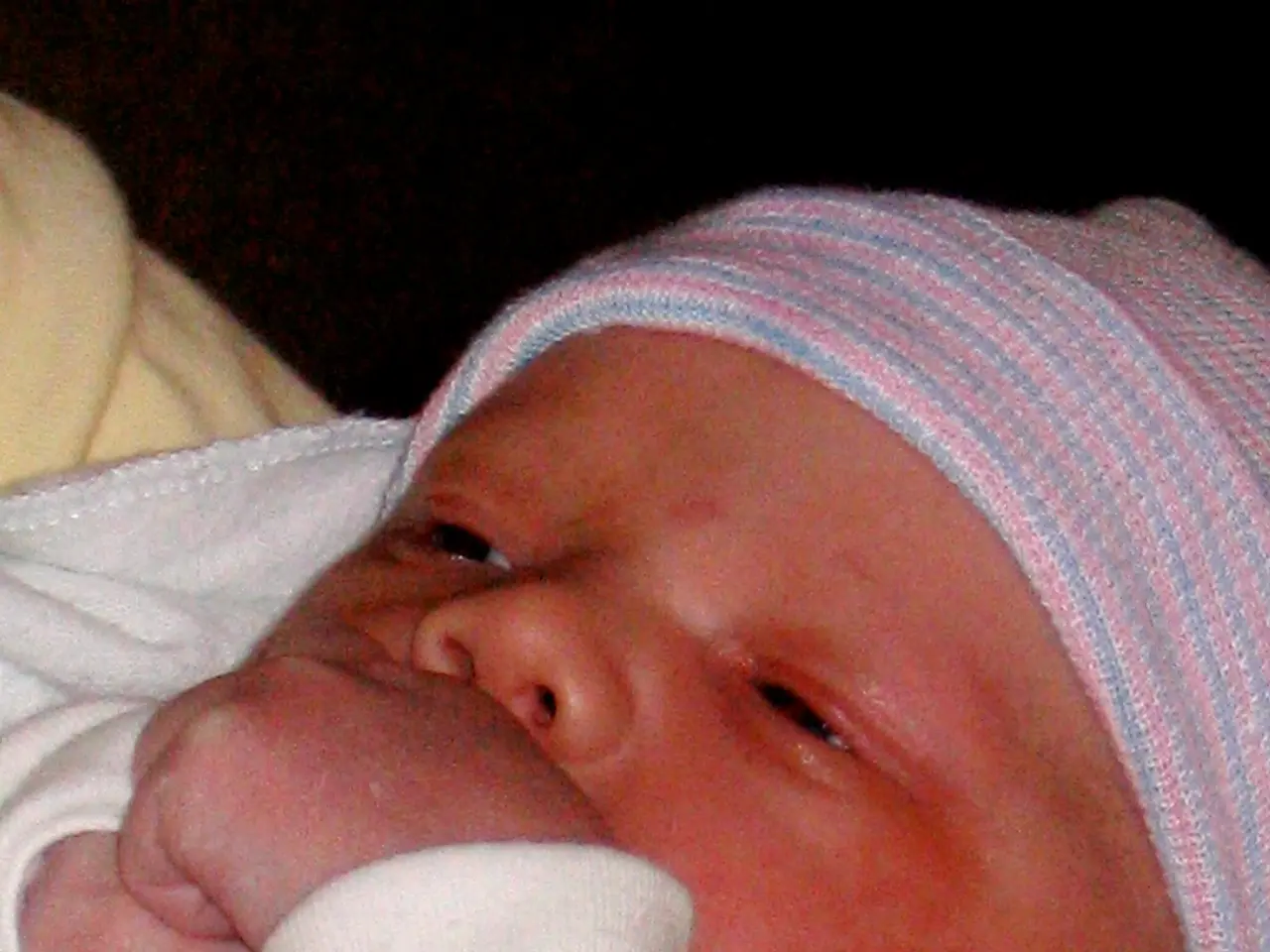Routine for Baby Hygiene: Is It Necessary to Clean Baby's Tongue?
In the early months of a baby's life, maintaining oral hygiene can be a concern for many parents. However, according to Dr. Shannon Thompson, a pediatrician at the Cleveland Clinic, a non-profit academic medical center, cleaning a baby's tongue is not necessary unless they are teething, have teeth, or you suspect a fungal infection known as thrush[1].
Before teething begins, around 4 to 6 months old, a baby's mouth doesn't require daily cleaning interventions. Thrush, which can appear as creamy white spots on a baby's tongue or inside their cheeks, is not caused by a milky tongue[2]. Suspecting a baby may have thrush is another reason to consider cleaning their tongue.
When a baby starts teething, the recommended method is to use a small, soft toothbrush or a damp washcloth. You can moisten these with a tiny bit of water (and a grain-size drop of toothpaste if teeth are present). Gently swipe their gums, tongue, and the inside of their cheeks using circular motions, avoiding activating their gag reflex[1].
It's important to note that cleaning a baby's tongue in their first few months of life does not help them develop a tolerance for toothbrushing. Furthermore, rinsing a baby's mouth after cleaning is not recommended as they shouldn't have water until they're 6 months old[3].
If you're checking for thrush, look to see if the milky residue wipes away. If it does, all is well. If white lesions or residue remain, it might be thrush. Thrush is typically treated with prescription antifungal medications. If you suspect your baby has thrush, call a children's healthcare provider, like your pediatrician[2].
In summary, before teeth come in, cleaning the tongue daily is optional and should be done gently if done at all. Once teething starts, use a small soft toothbrush or damp cloth. Use a grain-size amount of toothpaste only after teeth appear. Clean gums, tongue, and cheeks gently with circular motions. Avoid going too far back in the mouth to prevent gagging or discomfort. This approach ensures safety and comfort for your teething baby while maintaining oral hygiene according to Dr. Thompson’s guidance[1].
If a baby isn't teething, wrap your finger in a clean washcloth to clean their mouth. Cleaning a newborn's tongue in the first few months of their lives doesn't help them develop a tolerance for toothbrushing. Dr. Thompson clarifies that cleaning a baby's tongue once a day is safe as long as it's done gently, but it's not typically recommended until the baby has a tooth[4]. Use a tiny bit of water to dampen the cloth or toothbrush before cleaning a baby's mouth.
References: [1] Thompson, S. (2021). Oral Hygiene for Infants: When to Start and How to Do It. Cleveland Clinic. Retrieved from https://my.clevelandclinic.org/health/articles/18082-oral-hygiene-for-infants-when-to-start-and-how-to-do-it [2] Mayo Clinic Staff. (2020). Thrush (Oral Thrush). Mayo Clinic. Retrieved from https://www.mayoclinic.org/diseases-conditions/thrush/symptoms-causes/syc-20374571 [3] American Academy of Pediatrics. (2019). Infant Oral Health. HealthyChildren.org. Retrieved from https://www.healthychildren.org/English/health-issues/conditions/oral-health/pages/Infant-Oral-Health.aspx [4] Thompson, S. (2021). Oral Hygiene for Infants: When to Start and How to Do It. Cleveland Clinic. Retrieved from https://my.clevelandclinic.org/health/articles/18082-oral-hygiene-for-infants-when-to-start-and-how-to-do-it
Where oral hygiene is concerned for family health, parents might question the need for cleaning a baby's tongue before they start teething. However, according to Dr. Thompson's health-and-wellness advice, it's not essential to clean a baby's tongue in their first few months unless they have symptoms of thrush.
When a baby is teething, mental-health support for parents becomes crucial too, as they navigate the challenges of parenting during this period. Using a soft toothbrush or damp cloth, cleaning a baby's gums, tongue, and cheeks can be a part of maintaining their oral health according to the recommended science-backed methods.
In the case of suspecting thrush, a notification should be made to your pediatrician for appropriate mental-health and health-and-wellness guidance, as the condition typically requires prescription treatment. Keeping a close eye on your child's oral health, and consulting with your healthcare provider when necessary, is an important aspect of ensuring their overall well-being.




